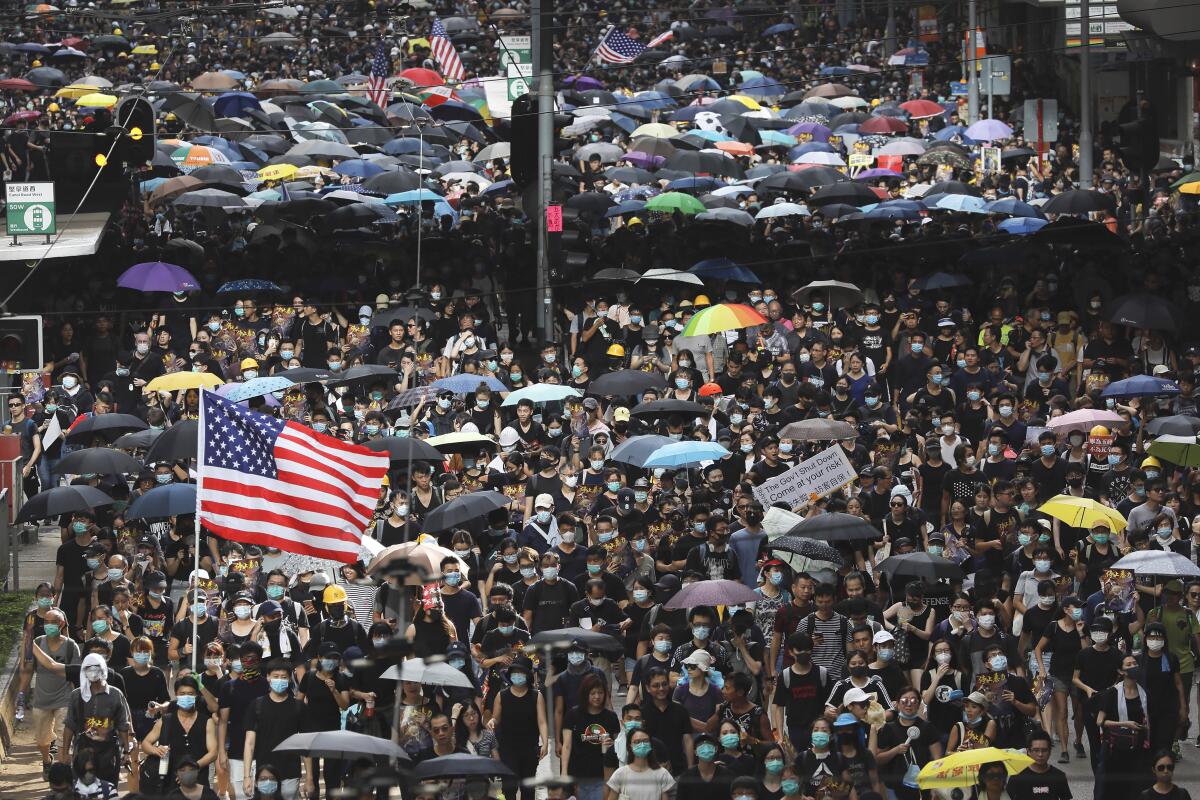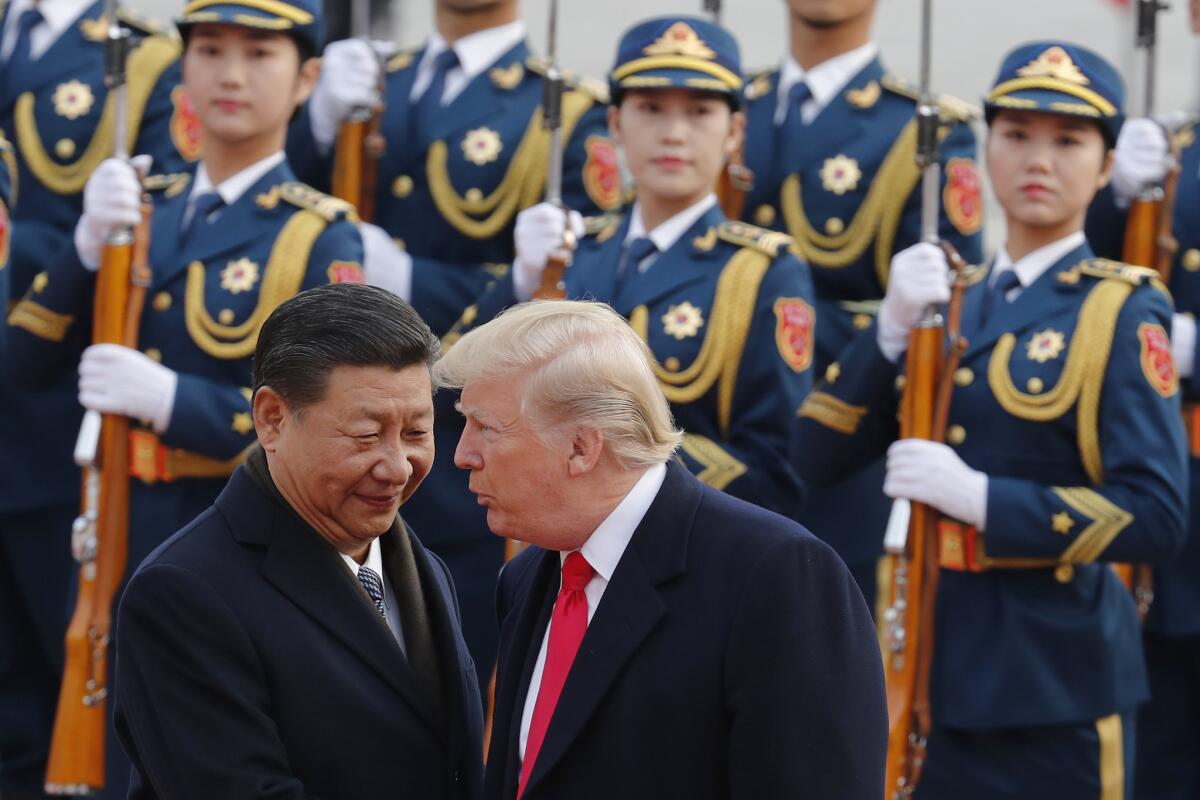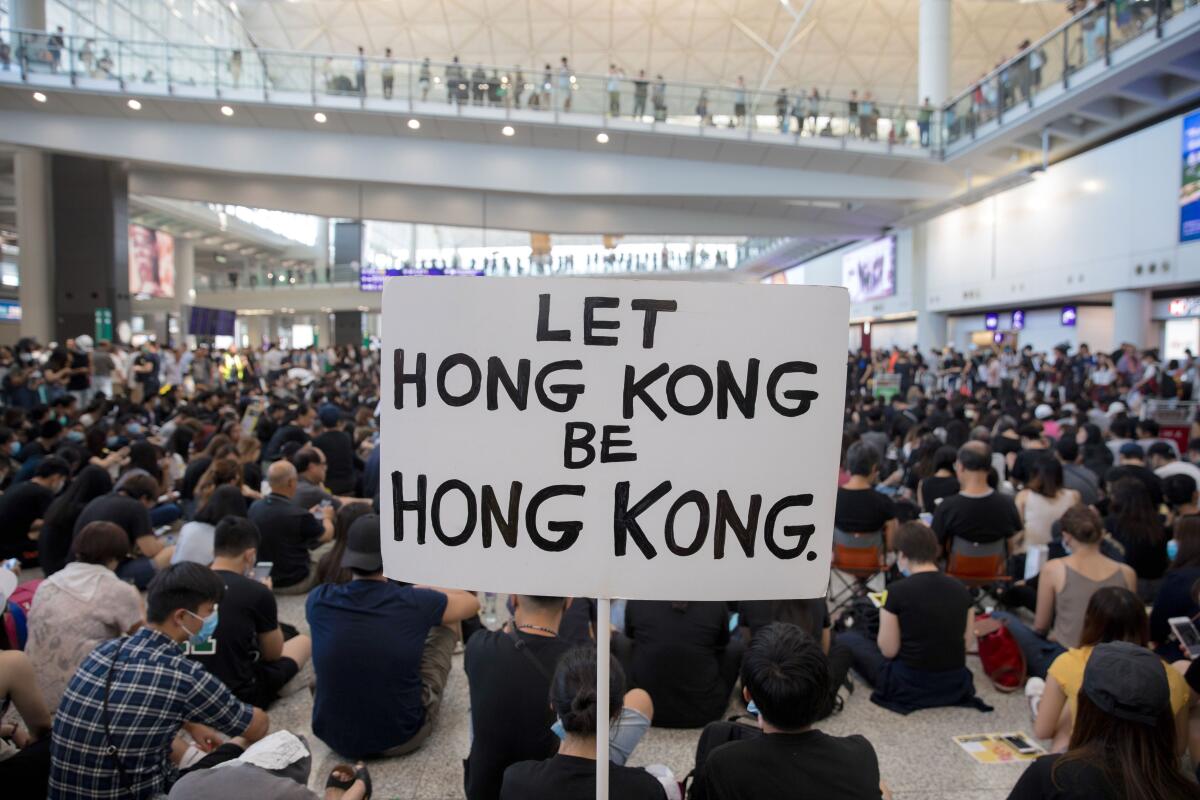Trump praises Chinese leader, not Hong Kong protesters seeking democratic reforms

- Share via
WASHINGTON — On a recent night, standing shoulder to shoulder in a darkened street, anti-government protesters in Hong Kong waved American flags and sang the U.S. national anthem, the words blaring through scratchy megaphones.
Vast crowds of Hong Kong citizens have marched and staged sit-ins over the last 10 weeks in a city that fears its limited autonomy is under direct threat by Beijing, and U.S. flags have been among the potent symbols used to rally for democratic reforms and an investigation into alleged police brutality.
But President Trump’s reaction has ranged from muddled to indifferent, displaying his disinclination to use his office to promote democracy around the world — a task many of his predecessors viewed as a core part of the job — and his focus on trade over human rights.
“We have a responsibility to speak up. Instead of doing that, the president is opening the door to Chinese intervention,” said Nicholas Burns, a former veteran U.S. diplomat now at Harvard. “It disavows the obligations we have to the people of Hong Kong and to our role as the strongest democratic power in the world.”
Trump has voiced his strongest support for Chinese President Xi Jinping, not the protesters seeking democratic reforms, praising the Communist leader as “a good man in a ‘tough business.’”
“If President Xi would meet directly and personally with the protesters, there would be a happy and enlightened ending to the Hong Kong problem,” Trump tweeted Thursday. “I have no doubt!”
But Trump has also linked the anti-government protests with his damaging trade war with China, showing his fixation on reaching an agreement with Beijing and injecting a combustible new bargaining chip into already volatile negotiations.
“Of course China wants to make a deal,” he tweeted. “Let them work humanely with Hong Kong first!”

Although some protests have ended in violent clashes with police, Democratic and Republican lawmakers and State Department officials have steadfastly backed the protesters’ demands or voiced their opposition to a harsh crackdown by Beijing.
But Trump has been reluctant to publicly support the protesters seeking free elections and other demands.
“It’s a very tricky situation. I think it will work out and I hope it works out, for liberty,” Trump told reporters this week. “I hope it works out for everybody, including China.”
Before that, Trump praised Xi for acting “very responsibly” by allowing the protests to continue.
Yaqiu Wang, a China researcher at Human Rights Watch, described Trump’s praise for Xi as “very disturbing.”
“It is unclear whether President Trump is signaling a crackdown or not or whether he is trying to signal anything,” Wang said.
He urged Trump to “consistently and publicly voice — via Twitter or other channels — his support to Hong Kong people’s peaceful activism in pursuit of freedom.”
Commerce Secretary Wilbur Ross described the Hong Kong protests as an “internal matter” for China, echoing Beijing’s defense whenever it is accused of human rights abuses. He denied that previous administrations would have handled the situation any differently.
“I don’t know if we would have done anything different in the past,” Ross told CNBC on Wednesday. “What would we do? Invade Hong Kong?”
A senior administration official said that Washington “continues to monitor the situation in Hong Kong, and we urge all sides to remain calm, safe and peaceful.”
The official added that “freedoms of expression and assembly are core values that we share with the people of Hong Kong and these freedoms should be protected,” but did not elaborate on what steps the U.S. was taking to ensure those values are protected.

Previous U.S. presidents have worked with despotic leaders, especially during the Cold War, but Trump has sometimes embraced strongmen in unflinching terms while criticizing traditional U.S. allies and alliances.
He has showered praise on Russia’s repressive leader, Vladimir Putin, and North Korea’s totalitarian ruler, Kim Jong Un, as well as autocrats in Brazil, Hungary, the Philippines and elsewhere. He has expressed a grudging respect for Xi even as he criticizes China’s economic policies.
Trump’s critics worry he will look the other way if Chinese paramilitary forces, who have been massing outside Hong Kong, roll in to stamp out the protests. After the Tiananmen Square massacre in Beijing in 1989, Trump applauded the military crackdown that caused the deaths of hundreds, if not thousands, of people.
“When the students poured into Tiananmen Square, the Chinese government almost blew it,” the future president told Playboy in 1990. “Then they were vicious, they were horrible, but they put it down with strength. That shows you the power of strength.”
President George H.W. Bush, who had headed the U.S. Liaison Office in China in the mid-1970s, publicly denounced the Tiananmen Square slaughter and enacted some sanctions on Beijing. But his administration privately signaled that he wanted to continue strengthening U.S. ties with China.
“The U.S. was trying to show its unhappiness with what China had done, but not throw the baby out with the bathwater,” said Doug Paal, who served on the National Security Council at the time.
Paal, now at the Carnegie Endowment for Peace, a nonpartisan think tank, said Chinese diplomats have privately expressed confidence in recent weeks that Trump has no interest in the Hong Kong protests and is narrowly focused on his trade dispute with China.
While other presidents rose through politics by paying homage to America as a democratic beacon, Paal said, “Trump skipped that whole process. He came up with a fixated idea on trade deficits.”
Dean Cheng, a senior research fellow at the Heritage Foundation, another Washington think tank, said Trump’s linkage of trade talks to the Hong Kong protests could constrain Beijing’s response to the crisis. A violent crackdown could make it politically untenable for Trump to reach a deal, he argued.
No U.S. president, Cheng said, can have a replay of Tiananmen Square “and then say, let me sign this agreement.”
To some extent, the White House is in a bind over Hong Kong. If Trump expresses support for the protesters, China could accuse Washington of fomenting dissent and accuse the demonstrators of being pawns of a foreign power. If he remains silent, it could appear as a green light for intervention.
President Obama faced a similar dilemma in 2009, when Iranians filled the streets to protest a contested presidential election. Obama downplayed the so-called Green Movement political uprising, eventually hardening his rhetoric only when the Iranian regime launched a violent crackdown.
In the end, Tehran blamed the U.S. for fomenting the revolt, while Republicans accused Obama of abandoning the protesters and American values. Obama went on to negotiate a nuclear deal with Iran’s leaders, finalizing the agreement in 2015, although Trump abandoned it last year.
Jude Blanchette, a China scholar at the nonpartisan Center for Strategic and International Studies, fears the Trump administration will be unprepared if Beijing sends security forces in to quell the protests.
“It will be the single most significant geopolitical event in recent memory if mainland forces enter Hong Kong,” Blanchette said. “That would require a very sophisticated, coordinated response to make sure we’re getting that right.”
More to Read
Get the L.A. Times Politics newsletter
Deeply reported insights into legislation, politics and policy from Sacramento, Washington and beyond. In your inbox twice per week.
You may occasionally receive promotional content from the Los Angeles Times.











